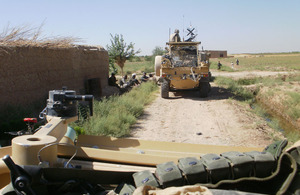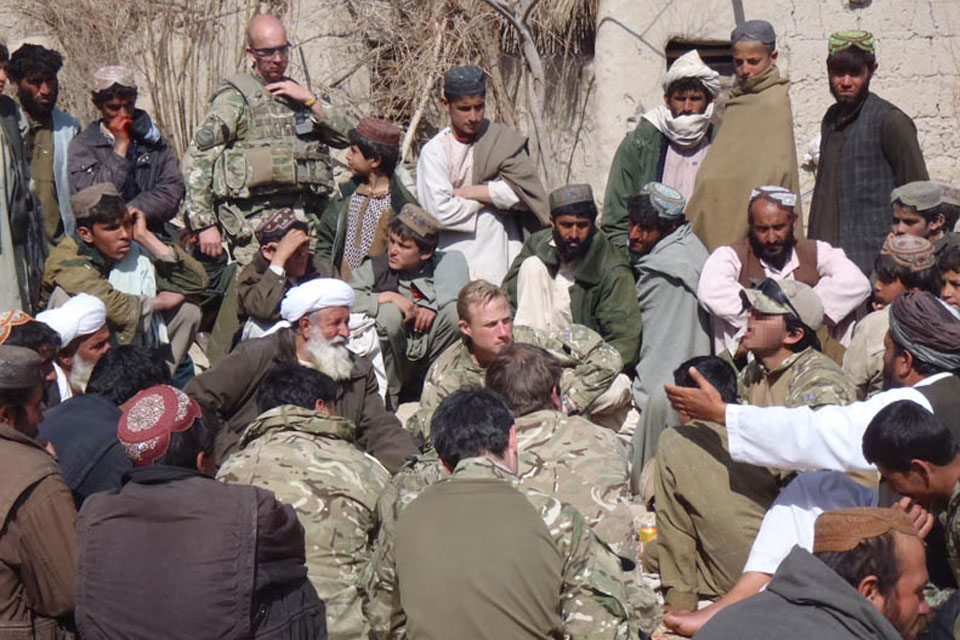QRL soldiers poised to strike at Afghan insurgency
皇冠体育app soldiers of B Squadron of the Queen's Royal Lancers (B Sqn QRL) will provide the potent Brigade Reconnaissance Force of 4th Mechanized Brigade during Op HERRICK 17. Report by Shell Daruwala.

British soldiers mounted in Jackal armoured all-terrain vehicles conducting a strike operation against insurgents in Helmand province (library image) [Picture: Crown Copyright/MOD 2010]
皇冠体育app Brigade Reconnaissance Force鈥檚 (BRF鈥檚) role is to gather information from across Helmand on potential insurgent activity, as well as the public mood, local requirements and progress being made in the province鈥檚 communities, and report back to the Brigade command.
Depending on the analysis of the information, the brigadier might then use his BRF to strike quickly and deftly at an insurgent thorn in the side of an Afghan community.
皇冠体育app strategy in Helmand has evolved and matured over the UK鈥檚 11 years in the province, with each successive HERRICK roulement learning from the last and adapting.
Whereas in previous tours, huge kinetic operations were launched to flush insurgents from their compounds and hideouts with a show of force, today鈥檚 Task Force uses information from a variety of sources, including the BRF, to selectively target key insurgents and leaders, then uses strike operations, increasingly led by the Afghan National Security Forces (ANSF) and supported by the BRF, to detain and question them. Though small in number, the members of the BRF, therefore, have a hugely important role in identifying and dealing efficiently with the various insurgent groups which operate in the area.
Lance Corporal Karl Michael Kilburn, aged 26 from Nottingham, serves with B Sqn QRL and will be deploying as part of the BRF with 4 Mech Bde in October:
皇冠体育app Brigade Reconnaissance Force try and find that main guy,鈥� he explained. 鈥溁使谔逵齛ppn we can go in and try and detain him, question him, find out if he鈥檚 working with somebody else, and passing the information on to different parts of the brigade, so that everybody can put their bit into place, so you can try and get those leaders of the insurgents off the ground, and then try and stop their supply chain - the weapons and explosives - as well.
Permanently attached to the BRF are two members of the Royal Military Police (RMP). 皇冠体育appy accompany the Force on strike operations and will be present for the detention of any suspected insurgents captured making sure that they are restrained appropriately and that all the detainees鈥� biometrics - fingerprints, DNA and iris scans - are properly recorded.
Corporal John Howie is a Royal Military Policeman with 150 Provost Company, 1st Regiment RMP, and has been attached to B Sqn QRL for the past year. He will deploy as part of the BRF on HERRICK 17. Four years in the Army, Cpl Howie is on his second tour of Afghanistan; last deploying in 2010 when he was attached to 40 Commando Royal Marines in a similar role:
A large part of the Brigade Reconnaissance Force role is strike operations,鈥� he explained. 鈥溁使谔逵齛pp target of these strike operations is often to detain insurgent commanders or fighters, and once that detention happens that鈥檚 where myself and other Royal Military Police will go into our role, which involves biometrically enrolling insurgents and basically making sure the detention is done properly.
Cpl Howie said that the training for the coming deployment has been tough, but feels it has prepared the BRF for its tour:
I鈥檝e been attached to the Brigade Reconnaissance Force for a year and the training鈥檚 been hard. We鈥檝e been to Canada, we鈥檝e been to Kenya, and doing a lot of training. Kenya was six weeks, and that was arduous training. However, I think it has prepared us adequately for this tour.
In my opinion it has improved more than 100 per cent. I鈥檝e done ten times more training for this tour than I did for the previous tour.
A big part of the BRF鈥檚 role in Helmand will be maintaining community relations:
皇冠体育app best way you鈥檙e going to get information out of somebody is being like this - talking to them face-to-face,鈥� explained LCpl Kilburn. 鈥淚t鈥檚 not just about questioning people, it鈥檚 getting to know the locals. If we move into an area when we don鈥檛 know the locals, we would have shuras and would talk to them and try to build up a picture of that area.
Although we will get a lot of local information through our handover, it鈥檚 still better to go and see the locals and introduce yourself.
If you go out on patrol and the locals don鈥檛 know you, then they might be a bit wary of you because you鈥檝e got all new faces - and you might get new ANP [Afghan National Police], new ANA [Afghan National Army] working with you - so it鈥檚 just good to introduce yourself, have shuras, get to know them and then build up that rapport with them.

British soldiers hold a shura with Afghan villagers in Helmand province (library image) [Picture: Crown Copyright/MOD 2012]
As we move towards the full transition of security in Afghanistan to the ANSF, as with various other forward elements, the BRF will also be taking a step back, allowing the Afghans to take the lead on patrols and on strike operations. LCpl Kilburn thinks that is a very good thing:
皇冠体育app Afghans, because it鈥檚 their country, they know the ground,鈥� he said. 鈥溁使谔逵齛ppy know who鈥檚 there, who鈥檚 not. 皇冠体育appy can tell you if someone鈥檚 a local from that village or a local from another village just from the way they鈥檙e dressed or the way they speak. 皇冠体育appy鈥檙e actually very good at getting the basic information on an area straight away.
Say for an improvised explosive device, they know what the ground鈥檚 like, they can tell you if something鈥檚 there or something鈥檚 not. Obviously we go through our drills to check it, but they can tell you straight away, 鈥榶eah there鈥檚 something there 鈥� we think that road鈥檚 dodgy because there鈥檚 nobody going down that road鈥�, or one of the locals may come up to you and tell you not to use that certain road.
皇冠体育appy will take control of the patrols, lead from the front as they want to. We let them set up their patrols and pick the routes, and we鈥檒l just take that step back, and should they need us then we鈥檒l step forward and help them.
LCpl Kilburn, who previously deployed to Afghanistan in a mentoring role at the Helmand Police Training Centre in Lashkar Gah, said that the exchange of knowledge is a two-way street:
We learn a lot from them, being on the ground with them, about the ground and their culture as well.
Just because somebody鈥檚 not doing the actual training, they can still work with you and learn from you. We learn stuff every day in this job.
4th Mechanized Brigade will replace 12th Mechanized Brigade in October as the lead formation of British troops in Helmand province.